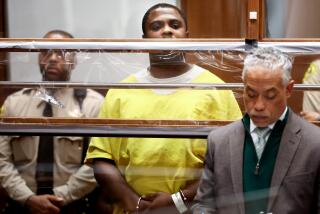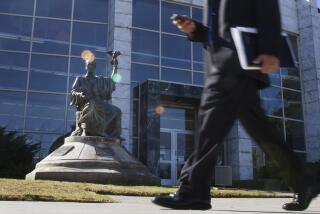Mother Pleads for Her Son in Bomb Case
- Share via
ATLANTA — The detonation of a crude but deadly pipe bomb in Centennial Olympic Park a month ago today first transformed 33-year-old security guard Richard Jewell into an unlikely hero, then into a prisoner in his mother’s home.
Jewell had alerted authorities to the bomb and then helped evacuate the area. He became a star, just as he reportedly had predicted to friends. But the bubble quickly burst after the FBI tagged the “hero” as their No. 1 suspect.
In the almost four weeks since, Jewell, who has not been charged, has become a virtual prisoner in his apartment, tried and convicted in the court of public opinion, his mother said Monday.
The former sheriff’s deputy and failed rock singer has had trouble keeping a steady job and lives with his mother. He is watched round the clock by FBI agents and a voracious media. They “descended upon us like vultures upon prey,” Barbara Jewell said. Her emotional press conference was part of a campaign by Jewell’s attorneys to pressure the Justice Department to declare him no longer a suspect.
Her son is innocent, she said. She made a plea to President Clinton to intervene with the FBI, “so that we can begin to pick up the pieces of our lives and move forward.”
“You have the power to end this nightmare,” she said, directing her comments to Clinton. “If the FBI does not intend to charge my son, please tell us. Please tell the world. Mr. President, please clear my son’s name.”
Then she broke down in tears and was escorted out of the room.
In a weeks-old media campaign of their own, Jewell’s attorneys, who are working for free, have portrayed him as a man wrongly singled out by the government and media in an irresponsible rush to judgment that has recent parallels.
In 1990, in another pipe-bombing case, the FBI shone a very public light on Robert Wayne O’Ferrell, an Alabama junk-store owner. For weeks reporters followed him as authorities questioned him, took hair samples, even drained the contents of his septic tank in a search for evidence. Each move was reported in the national press.
Another man eventually was convicted of the pipe bombings, but O’Ferrell, who developed a bleeding ulcer and whose 23-year marriage ended in divorce, has said his life never recovered from the public investigation.
In another case, Felix S. Bloch, a career diplomat, was investigated in 1989 for passing secrets to the Soviet Union. Bloch was put under 24-hour surveillance and followed around Washington, D.C., for weeks by the FBI, television crews and reporters. He eventually was fired and reportedly later worked as a bus driver and store clerk in North Carolina. He was never charged.
Watson Bryant, one of Jewell’s attorneys, suggested Monday that the FBI may have deliberately leaked his client’s name to the media in an attempt to pressure him in hopes he would crack. Bryant said: “They picked the wrong man. They are destroying him. . . . They are killing him and his mother before your eyes.”
Jay Spadafore, spokesman for the FBI’s Atlanta office, declined to discuss the investigation Monday beyond saying: “There are a number of suspects in the case. I have been directed not to discuss suspects, including Jewell.”
Agents earlier suggested that a case like this one could take months to solve.
A law enforcement source in Washington said a preliminary inquiry has begun into whether FBI agents leaked Jewell’s name. The source said, however, that a full investigation has not been launched because no one has specifically pointed a finger at the agency. A host of federal and local law enforcement agencies have been involved in the bomb investigation, and agents from any of them could have leaked Jewell’s name.
Almost every week, Jewell’s attorneys have staged an event designed to rehabilitate Jewell’s image. Last week, they released the results of a private polygraph test that showed, the attorneys said, that Jewell didn’t plant the bomb. The week before, attorneys walked the several blocks from the site of the bombing to the phone booth where a 911 call was made to warn of the device. The attorneys insisted that Jewell did not have time to walk the distance.
“Richard Jewell is a gentleman, and in the early morning hours of July 27 at Centennial Olympic Park, Richard Jewell did something that few of us here will ever be asked to do,” Lin Wood, one of the attorneys, said Monday. “He took steps that put his own life at risk in an effort to save the lives of others.”
Wood said Jewell fears that the nightmare his life has become will never end because of “a rush to judgment.”
There were reports several weeks ago that the FBI was preparing to refocus its investigation and apologize to Jewell. But an FBI source at the time denied that an apology was in the offing, saying: “We still believe he did it.”
A law enforcement official Monday said the federal stance on an apology remains unchanged.
Wood said Jewell’s attorneys are considering legal action against local media companies for damaging and inaccurate reporting about Jewell, including assertions that he matched an FBI profile of a bomber and that he clamored for press attention. Wood said Jewell became a public figure through no actions of his own but only because AT&T;, the company for which he worked, introduced him to the media.
The explosion directly killed one woman and injured 110. One man died of a heart attack; that, too, was ruled a homicide.
Saying that Richard and Barbara Jewell were victims “of two of the most powerful forces in the world today--the United States government and the media,” Bryant introduced Barbara Jewell, an insurance-claims coordinator, as “the 113th victim” of the bombing.
A bespectacled woman with graying hair, she told how journalists had rented an apartment across from the one she shares with her son. “We wake to photographers. We go to sleep to photographers. We cannot look out the windows. We cannot walk our dog without being photographed and confronted.”
When the FBI began to zero in on her son, she said, they turned the apartment upside-down, even taking away rugs, clothing, books and “Walt Disney tapes that I played for the children I baby-sat for.”
“They went through my personal papers and bills. . . . They went through my undergarments. They searched every inch of my house and every item in my house.”
She broke down twice while reading her statement and was led away before reporters could ask questions. She said Jewell himself had wept after attending the funeral of a friend whom he had not visited on his death bed because of the oppressive media presence.
Pausing momentarily and biting her lip, she said: “I do not think any of you can begin to imagine what our lives are like. Now my son has no real life. He is a prisoner in my home. . . .
“He did not do it. Richard is not the Olympic Park bomber. Richard is not a murderer.”
Times staff writer Robert L. Jackson in Washington contributed to this story.
More to Read
Sign up for Essential California
The most important California stories and recommendations in your inbox every morning.
You may occasionally receive promotional content from the Los Angeles Times.













